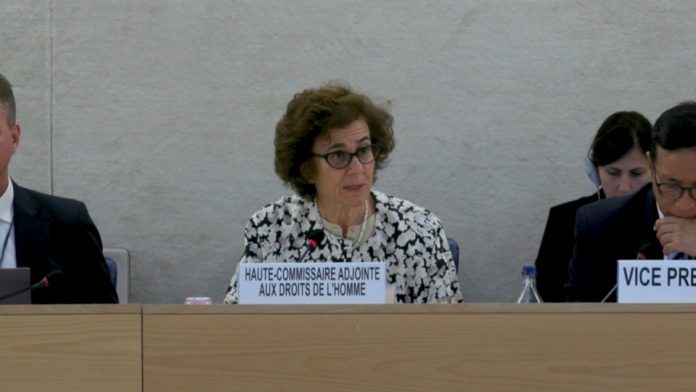Nada Al-Nashif, the U.N. Deputy High Commissioner for Human Rights, called the crisis in Myanmar unfolding since the 2021 military coup “an abyss of human suffering” at the U.N. Human Rights Council in Geneva, Switzerland on Tuesday.
“Entrenched in armed conflicts spreading the length and breadth of the country, the military continues to lose ground, exacting an ever-higher price along the way. Airstrikes and artillery – the military’s weapons of choice — have killed scores of civilians in villages and Internally Displaced Persons’ (IDP) camps, violating international human rights and humanitarian law,” said Al-Nashif.
She raised the situation in Arakan State, where human rights groups state that the Rohingya have been targeted by attacks from the Arakan Army (AA) and the military during fighting over control of northern Arakan’s Maungdaw and Buthidaung townships.
“While not comparable in scale and scope to the military, some ethnic armed groups have also harmed civilians, at times seemingly deliberately. Recently, the [U.N.] issued another warning about the possible reoccurrence of atrocities against Rohingya caught between the Arakan Army – which is forcing them to flee their homes — and the military, leaving them nowhere safe to run,” she added.
The U.N. has verified over 5,600 civilians, including 1,160 women and 624 children, killed by the Myanmar military since 2021. There are over 3.4 million people displaced from their homes by conflict who are now Internally Displaced Persons (IDPs) and the number of those impacted by recent flooding is nearly 900,000.
As the country’s economy continues on a downward trajectory, many essential commodities – to the extent they remain available – are becoming unaffordable for many. More than half the population now lives in poverty with Myanmar’s GDP dropping 12 percent annually on average since 2021.
“Yet rather than addressing the needs of the people and mitigating the crisis, the military have doubled down on repression and restrictions on humanitarian operations, especially in conflict-affected areas,” added Al-Nashif.
“There is an urgent need for political will and leadership at regional and international levels to demand, and achieve, a solution in the best interests of the people of Myanmar. It is imperative that [U.N] Member States, notably those with influence, work together to bolster and support ASEAN [the Association of Southeast Asian Nations] members to resolve this crisis and bring an end to the violence in Myanmar,” she concluded.
The Office of the U.N. High Commissioner for Human Rights, led by Volker Türk, has proposed steps to address key aspects of Myanmar’s crisis. It stated that the flow of arms, as well as other military material and aviation fuel, powering the military’s campaign of violence against the civilian population must stop. The political process must include the civilian-led National Unity Government (NUG), ethnic armed groups, and the pro-democracy movement, to define future solutions for the country.
REUTERS



